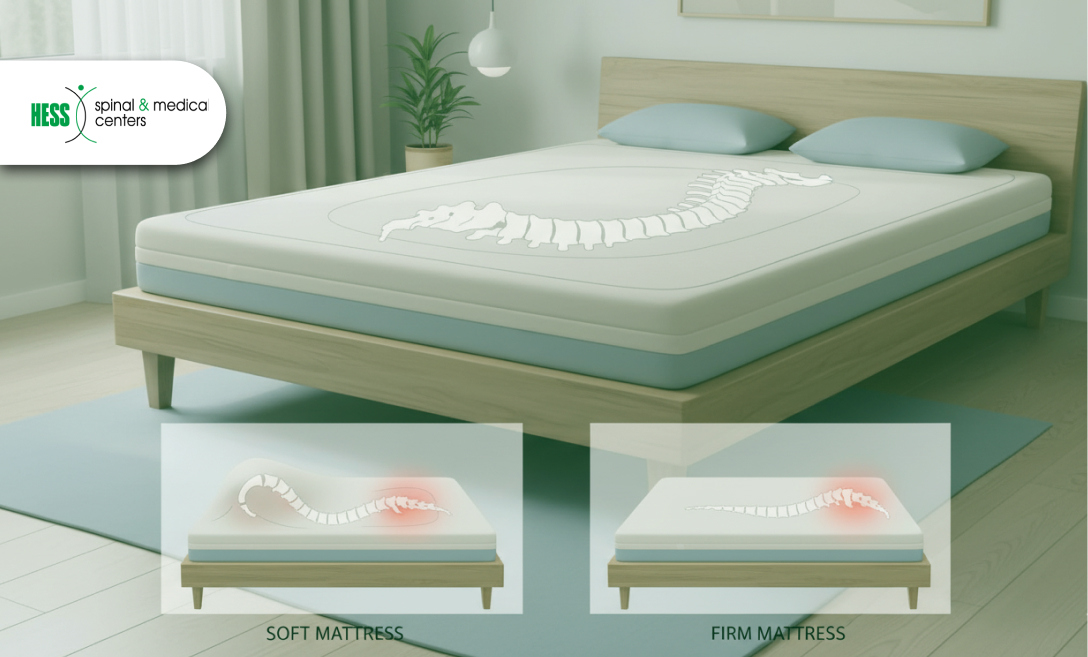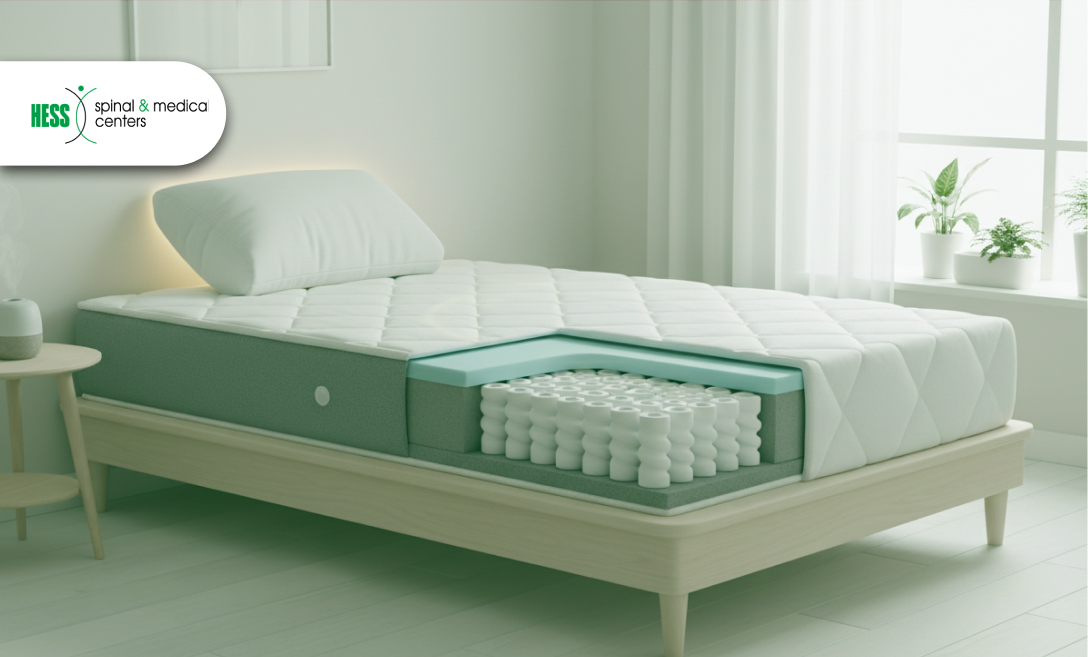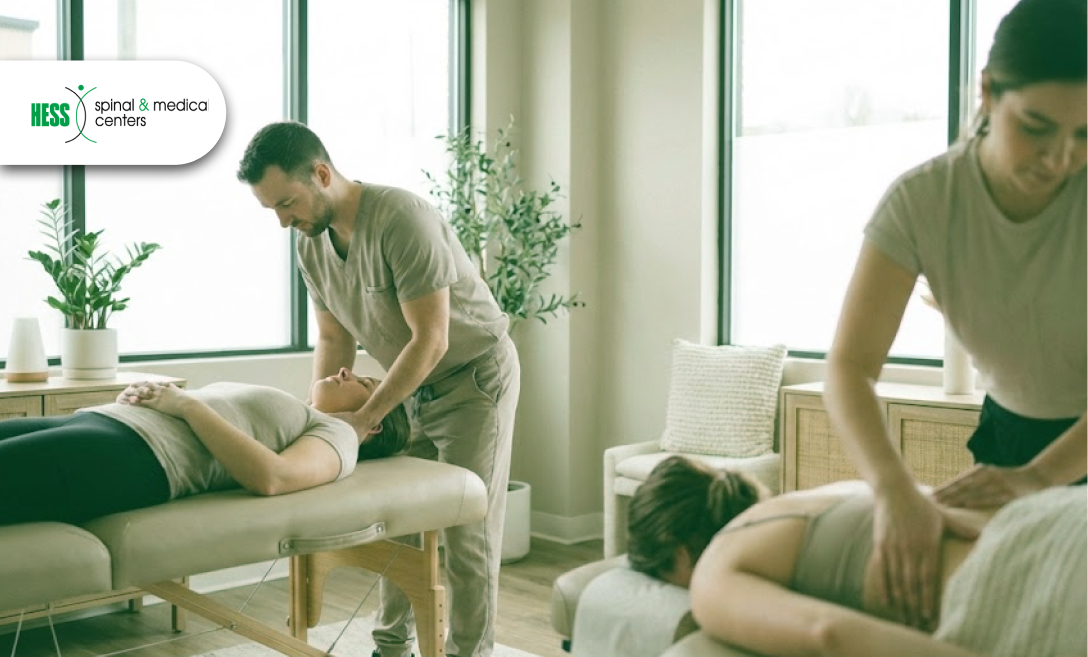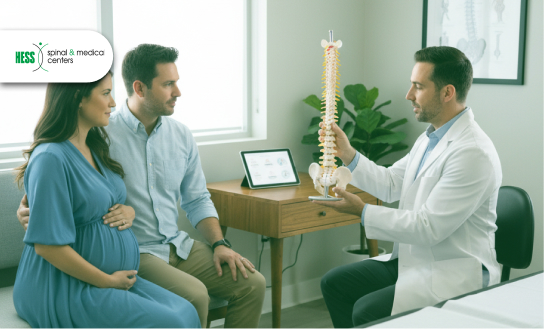
Can Poor Sleep or Mattress Choice Affect Your Spine Health?
Chiropractic Manipulation
November 22, 2025
Can Poor Sleep or Mattress Choice Affect Your Spine Health?

Poor sleep or mattress choice are two things most people never connect with spine health, yet I see the effects of both every day at my clinic. Patients often walk in convinced that their back pain comes from sitting too long or lifting something heavy, however the real trigger is sometimes the very thing meant to help them recover: their bed.
When your spine spends hours resting on the wrong surface, the body never fully relaxes. Instead of healing overnight, it keeps fighting to find balance, leaving you sore neck, a tight lower back, or even restless sleep can be your body’s quiet way of saying something’s wrong beneath the surface. And when we start connecting the dots between poor sleep, mattress quality, and spinal alignment, the story of your pain begins to change.
(1) Poor Sleep Damages Your Spine Health
People often ask me whether poor sleep can really harm the spine. The answer is yes, and it usually happens so gradually that most never notice until the pain becomes part of their daily routine.
When your spine doesn’t rest in its natural alignment for hours each night, the strain builds silently. Muscles tighten, joints compress, and nerves can become irritated, leaving you stiff or sore when you wake up.
Your body is designed to recover during sleep. It’s the time when muscles repair, spinal discs rehydrate, and tension melts away. However, if your mattress forces your spine into awkward angles, that recovery never fully happens.
Instead of restoring balance, your body spends the night fighting against poor support. The result is restless sleep, morning aches, and a cycle that repeats itself night after night.
I often remind patients that we spend nearly one-third of our lives asleep, yet few people ever think about what their spine is doing during those hours. At my medical center, I see it all the time, where a simple change in sleeping surface makes a dramatic difference.
When the spine is supported properly, muscles finally relax, nerves calm, and the body gets a real chance to heal.
What surprises most people is that improving spinal alignment during sleep doesn’t just relieve pain, it transforms how deeply they rest. Because when your body feels stable, your mind follows and that’s where true recovery begins.
(2) Your Mattress Could Be Causing Your Back Pain

The right mattress supports proper spinal alignment and reduces pressure points, while the wrong mattress can worsen back pain and lead to long-term posture problems. If it doesn’t support the natural curves of your spine, your body spends the night struggling to stay balanced instead of resting.
I’ve seen it happen countless times, where someone’s back pain has less to do with activity and more to do with the surface they sleep on.
When a mattress is too soft, your hips and shoulders sink out of alignment, pulling your spine into unnatural curves.
When a mattress is too firm, your body can’t relax because of pressure points that make you toss and turn all night.
Neither situation allows your muscles or joints to truly rest. The result is interrupted sleep and lingering tension that follows you into the morning.
Your spine depends on gentle, even support, much like a bridge depends on steady pillars. I often tell patients that a good mattress should feel like it’s holding you up, not fighting against you. The right surface lets your spine stay neutral, allowing your muscles to release the tension they carry throughout the day.
What many people don’t realize is that a poor mattress can undo the benefits of proper chiropractic care. You might feel great after an adjustment, only to have that progress reversed by sleeping on an unsupportive surface.
That’s why I always remind patients that healing doesn’t stop when they leave the clinic. It continues every night in the quiet hours of sleep, where the body has the chance to recover or repeat old patterns. And when that nightly recovery finally starts working in your favor, something powerful begins to shift.
(3) Your Sleeping Position and Spine Health
Posture is not just about how you sit or stand during the day. It also matters how your body rests when you are asleep, because those hours of stillness can either help or harm your spine.
I often tell patients that nighttime posture is silent but powerful. You might not feel the strain while you’re dreaming, but your muscles, joints, and nerves are definitely paying attention.
Each sleeping position has its own challenges,
Side sleepers often curl too tightly or let their necks drop, twisting the spine out of balance.
Back sleepers on sagging mattresses can lose the natural curve in their lower back.
Stomach sleepers, though comfortable at first, often wake up with stiff necks and tight shoulders.
When the spine is misaligned for six or seven hours straight, it is no wonder the body wakes up tired and sore.
The good news is that small changes can make a big difference. Sometimes it’s as simple as adding a pillow between your knees to keep your hips even, or choosing one that supports your neck without pushing your head forward.
Even subtle improvements in alignment during sleep can reduce tension, calm nerves, and help your body heal naturally.
At my clinic, I often see patients who have spent years fighting poor sleep without realizing that posture was the missing piece. Once they correct their sleeping position and pair it with regular chiropractic adjustments, the difference is remarkable.
They wake up looser, more rested, and often surprised that something as simple as posture could change the way they feel each morning.
When your sleeping posture supports your spine instead of stressing it, you give your body permission to rest deeply and that’s where true recovery begins to build momentum.
(4) Chiropractic Care is the Missing Link to Better Sleep

Sleep and spinal health are deeply connected, and chiropractic care can be the missing link that helps them work together again. When your spine is properly aligned, your body doesn’t have to fight tension all night, which allows you to rest instead of recover from poor posture.
Many patients at our clinic come in thinking they just need better sleep habits, only to realize that their spine has been sending quiet distress signals for months.
Chiropractic adjustments help restore that balance. They realign the spine, ease muscle tightness, and reduce the nerve irritation that often keeps the body in a low-grade state of stress.
Once muscle tension eases, the body can fully release stress and enter a state of relaxation. It’s like taking a deep breath after holding it in for too long. Suddenly, the body feels lighter, calmer, and more ready to rest.
What’s interesting is that once patients begin to sleep better, their adjustments tend to hold longer. This happens because the body isn’t undoing its own progress overnight. A well-aligned spine makes it easier to fall asleep comfortably and stay asleep without constant shifting or waking.
In turn, deeper sleep helps the body repair tissues and regulate hormones that support healing, creating a steady rhythm of improvement.
I often tell my patients that chiropractic care is not just about removing pain, rather it’s about teaching the body to function the way it was designed to. And when that alignment carries through into your sleep, something remarkable happens: the body begins to restore itself naturally, night after night.
At that point, your bed stops being a battleground and becomes part of your recovery, which is exactly how it should be.
(5) Choosing the Right Mattress That Supports Your Spine

The perfect mattress doesn’t look the same for everyone, yet there are a few principles I always share:
Your mattress should support the natural curves of your spine, especially in the neck and lower back.
It should distribute weight evenly, preventing pressure points that cause nighttime movement.
If your mattress is older than eight years or visibly sagging, it may be time to replace it.
Pair your mattress with a supportive pillow that keeps your head aligned with your spine, not tilted forward or back.
When in doubt, test different firmness levels by lying on them for several minutes. Your body will tell you what feels supportive rather than soft or stiff. Sometimes, even adding a supportive topper can make a noticeable difference until a new mattress is in the budget.
(6) Three Simple Nighttime Habits for Spine Health
A healthy spine depends not only on what you sleep on, instead how you prepare for rest. I often coach patients on small nighttime habits that can make a big difference.
Avoid screens for an hour before bed to calm your nervous system.
Stretch lightly to release tension.
Maintain a consistent sleep schedule so your body can recover predictably.
When combined with chiropractic adjustments, these habits help the body hold alignment longer and reduce the inflammation that keeps you from sleeping deeply.
(7) Rest Starts with the Right Support
At the end of the day, quality sleep and spinal health are two sides of the same coin. You cannot separate one from the other. If you wake up tired, sore, or stiff, it may not be “just how you sleep.” It might be how your mattress and posture are shaping your nights.
At our medical center, we work with patients to identify the root causes behind their poor sleep and spine discomfort, creating personalized care plans that include adjustments, posture training, and guidance on mattress support.
If you’re ready to wake up feeling truly rested, schedule a consultation to assess your spinal alignment and find the mattress setup that works best for your body.
Recent Cases














